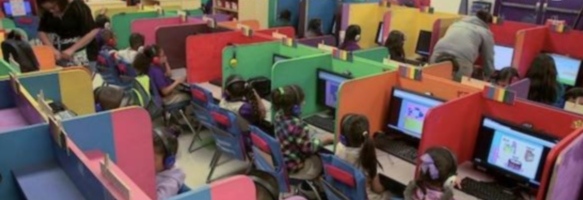There is confusion, we are told, by the corporations and politicians, as to how to define personalized learning. From Ed. Week…A number of education and technology organizations are seeking to forge a clearer understanding of what this concept really means. They just don’t seem to be able to pull it all together. Perhaps someone should tell them the missing link is a human.
However, don’t expect their confusion to lead them to value teachers anytime soon. Here is their ambitious computerized personalized agenda. It is so tight and controlled. Take note of their idea of the role of Staffers: In what ways might we structure teachers and other educator roles to support our instructional vision? What flexibility is needed to enable our staff to respond and adapt to changing student needs? Teachers are off on the sideline doing what they are told…not really involved in any decision-making. You can’t help but get the feeling that teachers and brick-in-mortar classrooms are on their way out with these people.
For years we have heard that disruption, meaning virtual, online, or cyber learning, would make way for something better in our schools. Of course, there are other high-tech gadgets like smart boards and iPhones too. But for the most part, disruption, to today’s ed. reformers, means a business plan to ultimately put students at home, learning online, or have them in Rocketship—schools where there are few teachers, certainly not qualified teachers, and mostly computers.
Sticking students onto computers full-time for total virtual instruction is the goal. The computer is the new teacher. And if you don’t think this is the favored way to go by those in charge, pay attention. While there is little money flowing to public schools these days, the coffers are filled with flowing greenbacks when it comes to technology. Don’t blink. Their agenda is right around the corner—confusion notwithstanding.
What is humiliating and terribly disingenuous to hard working teachers, is that many of these same ed. reformers have turned a blind eye, or even fought against, lowering class sizes to manageable numbers, and they are also the same people who can’t wait to get rid of Individual Education Plans and special education. But they adore the idea of virtual learning because it personalizes education. Give me a break.
When you hear about personalizing learning, and you read those intricate plans that focus on individualization, just know it is nothing to them but technology. More importantly, the students still have the same standards. They might talk about moving kids beyond once the standards are reached, but how far does any student move socially when they are dealing with a machine all day? And how tightly controlled will the computerized plan be no matter how advanced?
The trouble they have, which they don’t discuss, is that the studies that have come out by real researchers indicate that this homage to technology isn’t working well when it comes to learning. Rocketship blasted off to lackluster test scores, and anyone who pays any attention to education sees K12 Inc. as problematic. Both schools have had their share of corruption problems, and if they didn’t have such powerful lobbyists and investors they would have been long gone.
But in general, here are the problems with their definition of personalized learning when it comes to students:
- Information about the student’s progress is collected. Parents are concerned about such ongoing data collection. Who gets it? Where’s it stored? What else will it be used for?
- For those students who work online at home, there are few controls for cheating.
- There are still concerns that information collected online goes overseas to India or some far off place to people who are not properly vetted. This was a real problem with K12 Inc.with this. Also, it isn’t really very personal.
- Online learning means one teacher may be responsible for a hundred or more students. How personal is that?
- Has the software been validated? No. Of course, Common Core wasn’t validated either and it didn’t stop them from foisting it on schools.
- How long do we really want students online? Many parents already want their kids off of the computer without their being online all day at school!
- Worried about bullying? Cyberbullying is rough and tougher to get a handle on.
- We already know that young developing children can have health problems being online too long. What about older students?
- What are the long term social consequences involved with working non-stop on computers?
I’m sure I’m leaving out other consequences surrounding online learning. Real personalized learning starts at the door of a genuine school building when children and their parents are greeted by humans who know them personally. Parents and children want to be actively involved with teachers and staff in formulating a learning plan that outlines personalized goals—that aren’t from a narrow standardized program or a pick-and-choose group of impersonal objectives.
And don’t call me a Luddite. I like technology. When coordinated with good teaching, a variety of high-tech solutions can be a tremendous asset. But it works best when a teacher uses that technology to supplement what they do, along with a variety of other learning approaches. That’s how it can help students.
I also have a new Face Book page called Personalizing Education, but it is about looking at everything that has to do with Individual Educational Plans and students in special ed. I think the concept behind this kind of personalized learning should be for all students.
The problem with today’s ed. reformers’ personalized learning is that it is…well not really personal. You need a real human being for that kind of interaction.

Interesting article!